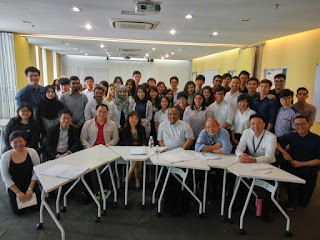Construction Law has been taught by Mr Wong Chong Wei,
a part time lecturer. This module covers Contracts Act, FIDIC Contract, and PAM
Contract. Throughout the lecture series, several topics were being highlighted
in class such as Formation of Construction Contracts as a basic knowledge, CIPAA
2012 and FIDIC Contract which can be used internationally.
Every students are given chance to conduct a seminar
during the tutorials session. The seminars were carried out after the lectures
have been conducted where selected students have to present their understanding
towards the topic discussed in the previous lecture. The seminar is conducted
by two students in a group where the students are assessed based on RICS
Professional Practice competency test which comprised of 3 Levels:
Level 1: tests on our knowledge towards the topic
discussed
Level 2: tests on the ability to apply knowledge into
application
Level 3: test on the ability to give advice
During my time of being a seminar leader on Week 3, I
found out that I hasn’t fully grasp the skills of answering the questions asked
and giving appropriate advise. Thus, I shall read more and practice on my analysis
and speaking skills in order to improve Level 2 and 3. However, I was able to
figure out the solutions to the questions under the guidance of Mr Wong. Throughout
the seminar, I gained experience on the type of answer expected for the RICS
Professional Practice competency test. By understanding the entire process, I
am able to focus on my weaker parts.
On the other hand, an overnight FIDIC workshop has
been carried out on 20-21 October 2016 where the workshop was hosted by Ms
Eugenie Lip, Executive Director of Davis Langdon KPK based in Singapore. Before
the workshop was conducted, we were assigned into a group of 14 people,
combination of Sem 5 juniors and us. We were given a case study assignment
which comes along with 16 questions to be solved by using clauses in PAM and
FIDIC Form. Of course, we distributed works fairly and work as a team with
juniors. On the presentation day, few members from the group were selected to
present on the stage. I believe that every member have contributed the best
efforts towards this workshop. From the workshop conducted, I realised that
team building and well communication among the group members are very important
in completing a task.
Although this subject is said to be similar to
Professional Practice 2 that I have learnt in Semester 5. However, it was found
to be more difficult as this subject require a more in-depth understanding
towards case laws and other contract form other than PAM Form. By taking
this module, I believed that I have gained knowledge about the different types
of construction contract used in the industry.
Last but not least, I would like
to express my sincere appreciation and gratitude to Mr Wong towards his
knowledge sharing and advises given throughout the classes.












